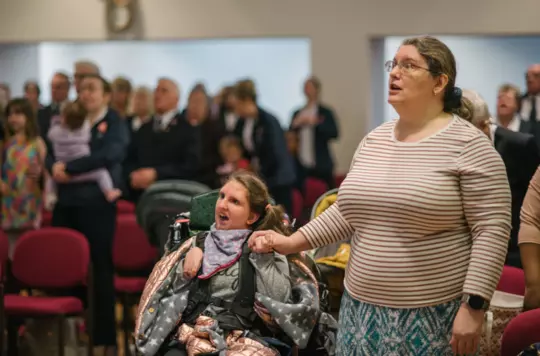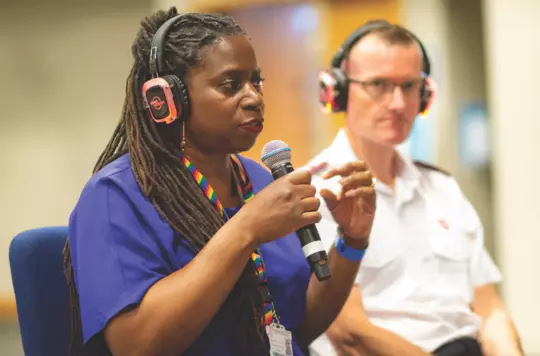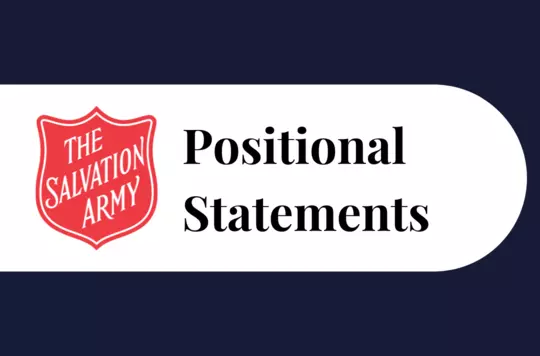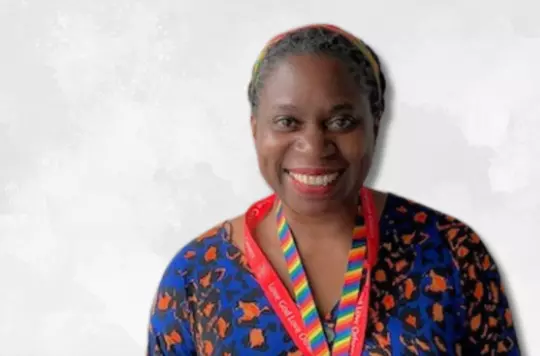5 April 2025
Equality and diversity: How does The Salvation Army model respect as an employer?
Stevie Hope

Equality and Diversity Manager Jen Laurent-Smart (THQ) talks to Stevie Hope about the UKI organisation’s Equity, Diversity, Inclusion and Belonging strategy.
For some people, ‘diversity’, ‘equity’ and ‘inclusion’ might appear just to be buzzwords. In reality, however, these terms hold an important place in seeing The Salvation Army’s values realised. And so, for employees in the UK and Ireland Territory, the organisation now has the new Equity, Diversity, Inclusion and Belonging (EDIB) Strategy!
Beyond being a jumble of jargon, this plan of action aims to help the Army help employees feel included, connected and belonging. Simply put, it describes what our organisation has always tried to do: serve the least, the last and the lost.
It hasn’t come out of nowhere. These ideas stem from years of work and reflection and are based on outcomes from such initiatives as the Racial Inclusion Working Group.
‘When we show people that we value them, they can experience a sense of belonging,’ Jen explains. ‘Then their engagement with the Army isn’t transactional; it’s because they feel valued and have a sense that they belong here.’
EDIB is therefore more than corporate box-ticking. While it’s true that these ideas reflect the Army’s duties as an employer – the Equality Act 2010, for example, legally protects people from discrimination in the workplace – the strategy is focused on ‘our wider Christian response to promoting and living out Kingdom values through respect’.
‘Legislation says “don’t discriminate”,’ Jen adds, ‘but we say “love God, love others”. I’d suggest that’s much more powerful!
‘We have these big values of respect, boldness, compassion, passion, integrity and mutual accountability. We chose these ourselves – they weren’t imposed on us. As a Christian-led movement, there’s greater responsibility on us.’
What does EDIB look like in practice? One great example is the territory’s position as a Disability Confident Leader, which is the highest level of the Department of Work and Pensions scheme. While the accreditation is mainly about employment practices, it reflects the way the territory at large actively seeks to include people with disabilities.
The latest step in this is a new Disability Forum. This gives employees, officers and territorial envoys who live with disabilities the opportunity to meet and share stories about their struggles and concerns working within the Army. In time, this should further shape the policies and culture of our Movement.
Reflecting on the forum’s first session in March, Jen comments on how it’s easy to address the obvious things – step-free access, large-print Bibles – but the smaller things might be missed.
‘It’s about identifying things we need to do – like training or raising awareness – and celebrating people,’ she concludes.
A conversation space for LGBTQ+ employees, called Open Circle, will also be starting this month. Leadership are keen for Open Circle to be a dedicated space to engage with and understand employees’ experiences.
Jen reiterates: ‘As an employer, we can’t discriminate against any protected group. We need to know if any of our employees are experiencing discrimination. If we don’t ask people about their experiences, we can’t address them.’
‘We’ve always been champions of the systematically disadvantaged and excluded,’ says Jen. ‘It all comes down to our organisational culture, the value we place on people and how we extend our care to them – how we love them.’
Written by

Stevie Hope
Editorial Assistant
Discover more

Ensuring equality, diversity and inclusion are at the heart of everything we do.

The Racial Inclusion Working Group concludes its work and introduces the territory’s Intercultural Mission Officers.

The Salvation Army's International Positional Statement on Persons With Disabilities.

Equality and Diversity Manager Jennifer Laurent-Smart (THQ) talks about creating an environment where everyone can flourish.